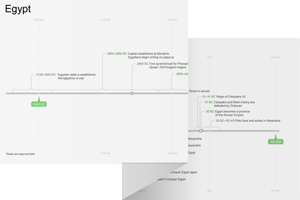44:1–30 Jeremiah prophesies against the entire population of Jews who fled to Egypt after the Babylonian invasion. He warns them against idolatry, using the destruction of Jerusalem to underscore the dire consequences of abandoning Yahweh again. The people’s defiant response (Jer 44:15–19) follows their usual pattern of ignoring Jeremiah’s prophecies, but they also offer a surprisingly different interpretation of their present circumstances, blaming the national disaster not on Yahweh’s judgment but on the displeasure of the “Queen of Heaven.” Jeremiah turns their explanation back on them, declaring that the idol-worship occurring in Judah was the reason for Yahweh’s wrath. If they persist in idolatry in Egypt, they will again suffer the punishment of Yahweh by sword and famine. |
44:1 Judeans who were living in the land of Egypt Archaeological evidence supports an increase in the population of Jewish communities in Egypt around this time. The most important evidence of Jewish daily life in Egypt comes from the colony at Elephantine. See note on Isa 49:12.
Migdol In the northeast of Egypt. See note on Ezek 29:10.
Tahpanhes A city in the central delta region.
Memphis A city in the central delta region. See note on Ezek 30:13.
the land of Pathros The southern region of Egypt. See note on Ezek 29:14.
44:2 the disaster that I have brought on Jerusalem The prophesied judgment (e.g., Jer 7:20; 9:11; 10:22) has occurred; they should take warning from the example.
44:3 to make smoke offerings, serving other gods The fundamental sin of Judah was idolatry. Compare 1:16; 7:9; 18:15; 19:4.
44:4 all my servants the prophets A common refrain in Jeremiah, highlighting how Israel had consistently rejected the message of Yahweh’s prophets. Compare 7:25; 25:4; 26:5; 29:19; 35:15.
this detestable The Hebrew word can refer to anything offensive but often refers specifically to something that offends Yahweh’s sense of holiness. See 6:15 and note.
44:5 But they did not listen Israel’s usual response. Compare 7:13, 26–27; 13:11; 22:21; 34:14; 38:15.
44:6 a site of ruins, as a desolation Compare 9:11; 10:22; 22:5; 34:22.
44:7 not leave over for yourselves a remnant A serious consequence, symbolizing a complete and final break with Yahweh. See note on Isa 1:9. Compare Isa 14:22 and note.
44:8 are becoming as a curse, and as a disgrace Compare Jer 42:18.
44:11 to exterminate all Judah The remnant that escaped to Egypt is under the same indictment of judgment for idolatry. Unless they repent, the punishment will follow them wherever they flee.
44:15 their wives were making smoke offerings to other gods The comparison with the rituals for the Queen of Heaven in 7:18–20 indicate the idolatry was a family affair.
44:16 we are not going to listen to you Their defiant response and persistent rebellion serves to justify Yahweh’s judgment. Ezekiel says the behavior of the fugitives will help explain Yahweh’s anger (see Ezek 12:16 and note; 14:22 and note).
44:17 the queen of heaven See note on Jer 7:18. Probably a reference to the goddess Ishtar or Astarte.
 Pagan Deities in the Old Testament Table
Pagan Deities in the Old Testament Table
we had enough to eat An idealized recollection of their prosperity in Judah prior to the Babylonian invasion, implying that the disaster came only after they stopped making offerings to the Queen of Heaven.
44:22 Yahweh was no longer able to bear it, because of the evil of your Jeremiah challenges their explanation. Their prosperity was from Yahweh, who was patiently tolerating their evil, giving them a chance to repent. Eventually, He could no longer bear it and had to punish them.
44:24 Judah who are in the land of Egypt Jeremiah reiterates the message of judgment—the people are free to persist in making their idolatrous offerings, but they should not be surprised when judgment comes on them in Egypt.
44:30 Pharaoh Hophra Reigned 589–570 bc. Hophra was the Egyptian king who led the army attempting to save Judah from Nebuchadnezzar’s siege (see Jer 37:5). The downfall of Hophra will be a sign to the remnant of coming judgment and of Yahweh’s sovereignty. Hophra was killed in a coup in 570 bc. See note on Ezek 29:2.

|
About Faithlife Study BibleFaithlife Study Bible (FSB) is your guide to the ancient world of the Old and New Testaments, with study notes and articles that draw from a wide range of academic research. FSB helps you learn how to think about interpretation methods and issues so that you can gain a deeper understanding of the text. |
| Copyright |
Copyright 2012 Logos Bible Software. |
| Support Info | fsb |
 Loading…
Loading…

